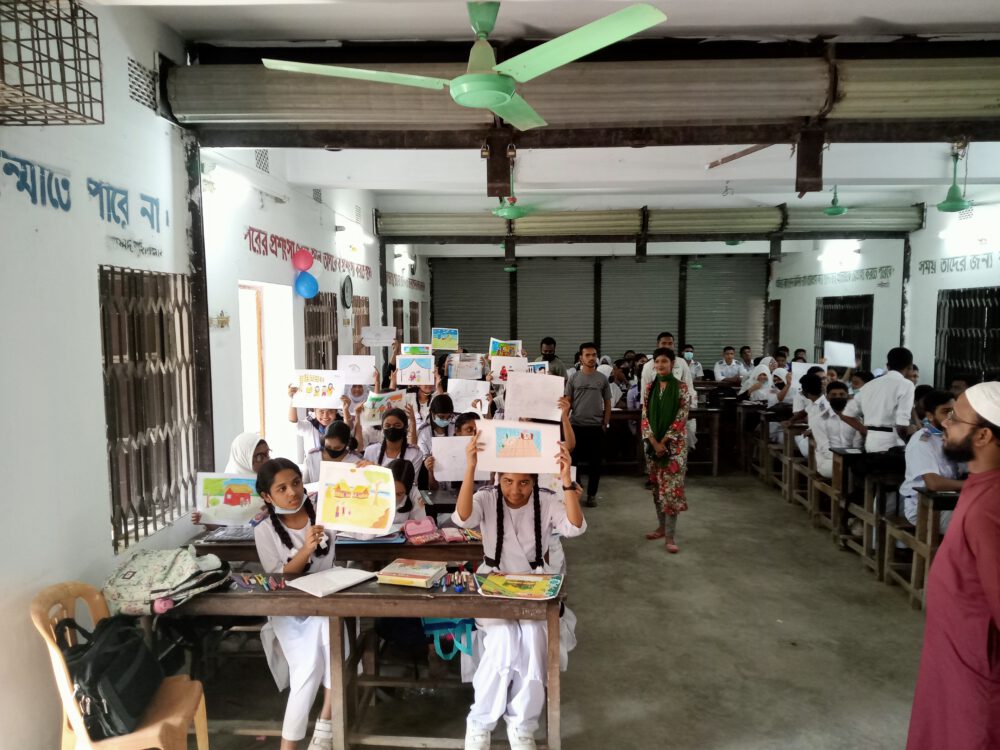Related
Read our latest articles, studies and columns on sexual health and rights.
The socio-cultural context in Bangladesh can be a major hurdle when it comes to implementing comprehensive sexuality education for all. Students and teachers’ testimonies help understand what’s at stake and the dangers of replacing comprehensive sexuality education in schools with online platforms.
In a video report published by Right Here Right Now partner BRAC, Bangladeshi school students reflect on the space that is given to sexuality education in their schools. They reveal the lack of information about this topic in school curricula as well as the difficulty as adolescents to find correct sexuality information online and among friends and relatives.
They are unanimous in thinking that comprehensive sexuality education (CSE) classes are not always given on a regular basis or “not as seriously as they should,” admits a student from Beltia high school in the city of Jamalpur while the majority of them highlight the difficulty to find school representatives to talk to.
“We are not confident to ask them about it. In addition, teachers do not speak to us openly in front of so many students,” young girl from Mukul Niketan High School based in the Bangladeshi city of Mymensingh.

“Embarrassment”, “lack of information”, “wrong information” or even “confusion” are common words used by the students that reflect how accessing sexuality information is not an easy task. The same is true of teachers who have been facing many challenges.
“We have to be extremely cautious while discussing anything related to genitalia or sexual abuse,” argues Mintu Mia Bokul, a teacher in Beltia High School, Jamalpur while teacher Mani Kana Saha from Mukul Niketan High School explains that “boys make objectionable noises” when the topic is raised, making the running of the course troublesome.
Teacher Shamima Akhter from Izzatun Nesa High School, Jamalpur can still see some interest in this topic from her students: “when we discuss puberty-related themes like pubic hair and broader hips, students in the 7th and 8th grades share their experiences.”
The absence of examination on the topic can also explain the lack of enthusiasm of some. “It wouldn’t be a bad thing if there was a ten-point question on teenagehood. In fact, students would benefit from knowing about it”, suggests Atikur Rahman working in Beltia High School in Jamalpur.

The taboo surrounding sexuality is so strong in the South-Asian country that teenagers try to find new spaces to get the right information and websites appear as the easiest resources to refer to, for better or for worse.
The vast majority of Bangladeshi internet users aged 15 to 24 have been confronted to pornography, worringly affecting their sexual behaviour. “When we search for body parts on Youtube or Google, we usually find pornographic websites or videos,” says one girl while a school boy confesses watching porn content occasionally. The lack of information in textbooks leading to online “misleading information” is a concern for many school kids. Online resources, while useful when supervised, can be a real danger when they give teenagers open access to violent and inappropriate content.
A survey was led, with the help of young advocates from 9 BRAC districts, to determine the extent to which sexual and reproductive health education is taught in 6th grade, 9th grade and 10th grade textbooks.
According to the survey, 67% of educational institutions offer physical education and health lessons to students in grades 6th, 9th and 10th. In 24% of educational institutions, classes are taken by teachers of other disciplines such as general science, mathematics, Bengali, religious education and librarianship. On the other hand, this chapter is not covered in 9% of educational institutions and when it comes to access personal hygiene products, sanitary pads and lidded trash cans were only provided in 14 schools (31%).
These figures reflect how CSE is a topic that is taken into account in some Bangladeshi schools even if tackling this issue among young people aged between 10 to 19, who represent more than a fifth of Bangladeshi’s population, remains uneasy.

Due to a lack of social recognition, sexual reproduction and health education do not target sexual minorities through textbooks. “when I was a 6th grade student, I became aware of my transformation and realised that I was not like the other boys. I used to feel that my body was not mine but society told me otherwise. I thought about suicide,” says a transwoman. In a heartbreaking testimony, she praises the importance of making sexual minorities visible in CSE curricula.
Read our latest articles, studies and columns on sexual health and rights.
Uw browser (Internet Explorer 11) is verouderd en wordt niet meer ondersteund. Hierdoor werkt deze website mogelijk niet juist. Installeer Google Chrome of update uw browser voor meer internetveiligheid en een beter weergave.